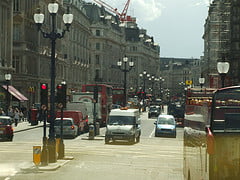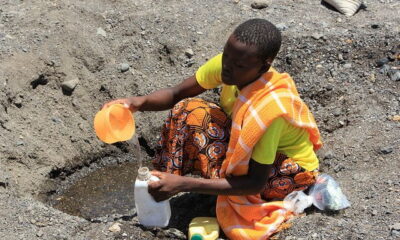

Environment
London’s air quality set to improve for Olympics
Measures put in place by Transport for London will reduce the environmental impact of the London 2012 Games to such a degree that air quality could improve. However, some ‘hotspots’ could see pollution breach legal limits.
A report released by Transport for London (TfL) looked in particular at the impact of the Olympic Route Network (ORN), which includes the roads used to link sporting venues. Athletes, officials and the media will all travel using the ORN alongside ordinary traffic. The report predicts that the introduction of traffic calming measures, such as road lane closures and traffic signal timings, could help reduce PM 10 particulates and nitrogen dioxide emissions.
Measures put in place by Transport for London will reduce the environmental impact of the London 2012 Games to such a degree that air quality could improve. However, some ‘hotspots’ could see pollution breach legal limits.
A report released by Transport for London (TfL) looked in particular at the impact of the Olympic Route Network (ORN), which includes the roads used to link sporting venues. Athletes, officials and the media will all travel using the ORN alongside ordinary traffic. The report predicts that the introduction of traffic calming measures, such as road lane closures and traffic signal timings, could help reduce PM 10 particulates and nitrogen dioxide emissions.
Michele Dix, TfL director of planning, explained that the commitment to keep London moving during the Games also required consideration of air quality. TfL commissioned King’s College London to conduct research assessing pollution caused by traffic over the summer.
Dix said, “The modelling indicates that overall there is expected to be a small net reduction in PM10 and NO2 emissions overall for London.”
However, ‘hotspots’ are also expected. In fact, pollution levels could exceed air quality legal limits at certain peak times, in particular for nitrogen dioxide emissions. Dix said, “Although some particular locations could see a temporary, but small, increase during Games time, TfL has identified appropriate measures to help further minimise these increases.”
TfL has already introduced initiatives to bring down pollution, for example, encouraging the use of low emission vehicles , using cleaner buses, and a no engine idling campaign, which go beyond reducing the impact of the Olympics and help meet long-term objectives.
A recent report from the Government into air pollution said that pollution at the London 2012 Games could be out of our control, because “the most likely health risk arising from air pollution during the Olympic Games is from an ozone event … the combination of air masses from continental Europe and warm weather with prolonged sunshine lead to elevated levels. Scope for local action in these circumstances is extremely limited, as such events are meteorologically driven and need long term international commitments to reduce emissions of precursor pollutants.”
However, the report also highlighted that businesses must look for different way to work and travel during the Olympics, and coined the term “public transport Games”.
The plans to reduce the number of people coming into London for work were announced last year, and preparations are currently being made. As the transport minister, Norman Baker, said in August 2011, “It’s time to oil the creaking bike, dig out the walking boots, work out how to use the video conferencing equipment, and fire up the laptop gathering dust at the back of the cupboard.”
Perhaps much can be learnt from people’s engagement with Olympic pollution reduction measures that can be applied to the future of transport.
Certainly, at Blue & Green Tomorrow we advocate walking or cycling wherever possible Olympics or not – it’s healthy for you and our blue and green planet. We also recommend offsetting carbon from necessary air travel, which is easy to do and cheaper than you might think. Check our travel page to find out more.
Related articles:
Row over air pollution: is it really ‘business as usual’?
Mayor of London to tackle city smog
Sustainability should be at the heart of transport
Picture source: firemedic58


 Environment12 months ago
Environment12 months agoAre Polymer Banknotes: an Eco-Friendly Trend or a Groundswell?

 Features11 months ago
Features11 months agoEco-Friendly Cryptocurrencies: Sustainable Investment Choices

 Energy11 months ago
Energy11 months agoThe Growing Role of Solar Panels in Ireland’s Energy Future

 Energy12 months ago
Energy12 months agoHow Renewable Energy Can Help Combat Climate Change, According to Indra Energy




























